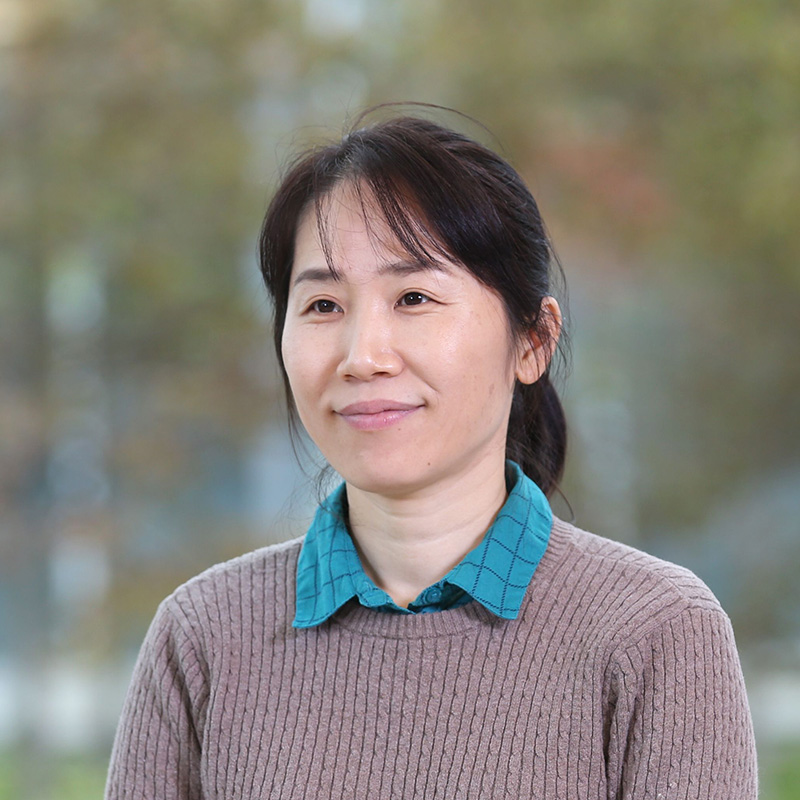
Gyeong Mee Yoon

Assistant professor
yoong@purdue.edu
765-496-1843
Cancer Biology
Plant Biology
Active Mentor - currently hosting PULSe students for laboratory rotations and recruiting PULSe students into the laboratory; serves on preliminary exam committees
Current Research Interests:
Dr. Yoon’s research interest lies in understanding of the molecular mechanisms of the key steps in the phytohormone ethylene biosynthesis and its signaling pathway using the model plant Arabidopsis thaliana. The gaseous hormone ethylene regulates many important plant growth and developmental processes, including seed germination, root hair formation, nodulation, senescence and response to a variety of developmental and environmental stresses. Two main research projects are currently under way in the lab. First is to investigate the molecular mechanism regulating protein turnover in ethylene biosynthesis. Specifically, we are aiming to understand the roles of phosphorylation in protein turnover of the 1-aminocyclopropane-1-carboxylic acid (ACC) synthase (ACS), a key enzyme in the ethylene biosynthesis and the Ethylene Overproducer 1 (ETO1)/ETO1-like (EOL) proteins, ubiquitin ligases that target a subset of ACS for degradation. Besides, we are also interested in identification and characterization of novel proteins regulating ethylene biosynthesis to acquire better insight in the molecular aspects of ethylene biosynthesis regulation. Secondly, we are focusing on elucidation of the roles of Constitutive Triple Response 1 (CTR1), a Raf-like mitogen activated protein kinase kinase kinase (MAPKKK) that acts as a negative regulator, in the ethylene signaling pathway. Ethylene is perceived by a family of ethylene receptors that are derived from two-component histidine kinase, and the receptors are located at the Endoplasmic Reticulum (ER). Recently, we resolved one of the longstanding questions in the ethylene signaling fields how ethylene signals are transduced from the ER to the nucleus to activate ethylene responsive genes in the nucleus. In the absence of ethylene, CTR1 phosphorylates EIN2, a critical positive regulator in the pathway, which blocks an activating proteolytic cleavage. In response to ethylene, the inactive CTR1 fails to phosphorylate EIN2, which is then cleaved by an unidentified protease, releasing the C-terminal domain that then migrates into the nucleus where it activates the transcription factor EIN3, either directly or indirectly, to regulate ethylene-mediated gene expression. Elucidation of the mechanism for regulating EIN2 in the ethylene signaling pathway bridges the gap between the signaling events from the receptor at the ER to the nucleus. However, this also raises a number of intriguing questions and our lab is particularly interested in understanding: 1) how do the ethylene receptors activate CTR1 in the early step of the ethylene signaling pathway?; 2) how does the ethylene response induced by the activation of EIN2 is turned off in the nucleus?; 3) and what are the roles of CTR1 other than phosphorylating EIN2 at the ER. We use the combination of biochemistry, genetics, cell biology and molecular biology approaches to address these questions.
Selected Publications:
1.Yoon GM and Kieber JJ. ACC synthase and Its cognate E3 ligase are inversely regulated by Light. (2013) Plant Signaling & Behavior. 2013;8(12):e26478. doi: 10.4161/psb.26478.
2.Yoon GM and Kieber JJ. 14-3-3 regulates 1-aminocyclopropane-1-carboxylate synthase protein turnover in Arabidopsis. (2013), Plant Cell. 25:1016-1028.
3.Yoon GM and Kieber JJ. ACC as a signaling molecule in plants (2013),AoB PLANTS. Plt017do:1093/aobpla/plt017.
4.Ju C*, Yoon GM*, Shemansky JM, Lin DY, Ying ZI, Chang J, Garrett WM, Kessenbrock M, Groth G, Tucker ML, Cooper B, Kieber JJ, and Chang C. CTR1 phosphorylates the central regulator EIN2 to control ethylene hormone signaling from the ER membrane to the nucleus in Arabidopsis.(2012), Proc. Natl. Acad. Sci. U S A. 109(47):19486-9112 (* Co-first authors).
5.Harpaz-Saad S, Yoon GM, Mattoo AK, and Kieber JJ. The formation of ACC and competition for SAM. (2012), Annual Plant Reviews: “The Plant Hormone Ethylene”.
6.Skottke KR, Yoon GM, Kieber JJ, DeLong A. Protein phosphatase 2A controls ethylene biosynthesis by differentially regulating the turnover of ACC synthase isoforms (2011), PLoS Genet. Apr; 7(4):e1001370. Epub 2011 Apr 21.
7.Yoon GM, Dowd PE, Gilroy S and McCubbin AG. Calcium-Dependent Protein kinase isoforms have distinct functions in pollen tube growth, including regulating polarity. (2006), Plant Cell.18 (4): 867-878.
8.Guo F *, Yoon GM * and McCubbin AG. PiSCP1 and PiCDPK2 localize to peroxisomes and are involved in pollen tube growth in petunia inflata (2013), Plants. 2(1):72-86; doi:10.3390/plants2010072.
9.Lee SS, Yoon GM, Rho EJ, Moon EP, and Pai HS. Functional characterization of NtCDPK1 in tobacco (2006), Molecules and Cells. 21:141-146.
10.Lee SS, Cho HS, Yoon GM, Ahn JW, Kim HH, Pai HS. Interaction of NtCDPK1 calcium-dependent protein kinase with NtRpn3 regulatory subunit of the 26S proteasome in Nicotiana tabacum (2003), Plant Journal. 33:825-840.
- Faculty Profile

